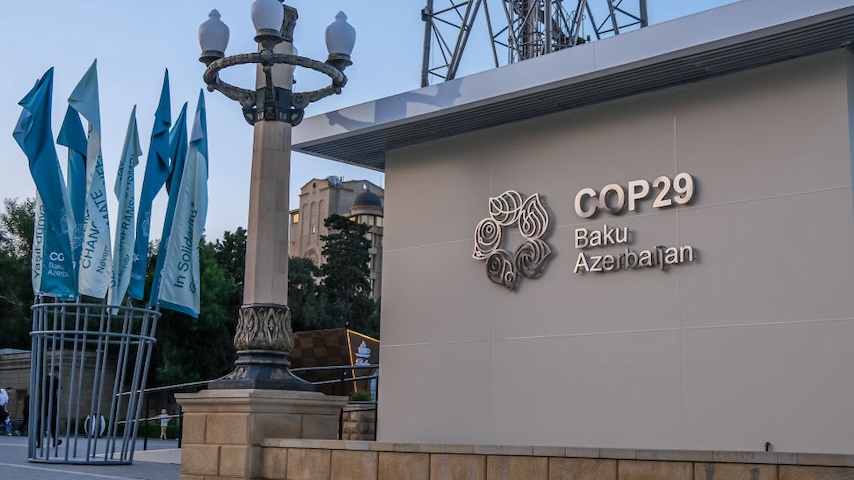Looking Ahead to an ‘Extremely Bleak’ COP29
Photo by Aziz Karimov/Getty Images
In Dubai last December, the world managed a historic first: A globally agreed-upon goal of “transitioning away” from fossil fuel use, in an effort to reach net-zero by 2050 and slow and eventually stop the world’s most important crisis.
Though historic at a glance, the COP28 result, known as the Dubai Consensus, wasn’t really all that great. It featured a variety of loopholes and caveats, including a focus on “transitional fuels” that functionally means extended fossil gas use, and of course it sits in the same liminal zone of unenforceable international agreements as anything else the U.N. climate process has produced — including the 2015 Paris Agreement.
There is likely a sort of collective momentum involved here, with countries maybe — *maybe* — not wanting to be seen as laggard pariahs on the international stage, but some facts are undeniable: It took the world 21 years into the era of the U.N.’s COP meetings to produce the Paris Agreement; it took another seven COPs beyond that to even admit that moving off of fossil fuels — literally the most basic principle behind the effort to stop climate change — was a good general goal to have; and even in a best-case scenario, countries’ climate policies and plans as currently formulated set the world on a track toward at least 2.5 degrees Celsius of warming, catastrophically far past the 1.5- or 2.0-degree targets set forth in Paris.
Which all certainly makes for a fun set-up as we approach COP29, to be held in the oil and gas-dependent country of Azerbaijan, in its capital of Baku beginning on November 11th. Much like with Dubai last year, Baku’s hosting duties got off to a banger of a start when the country appointed Mukhtar Babayev as COP president; currently the country’s environment minister, Babayev spent 26 years working at SOCAR, the state-owned oil and gas company.
To be fair, he did spend some of that time working to remediate some of the company’s environmental damage, but regardless, the basic task here starts to feel a bit Sisyphean when year after year the heavy weight of the oil industry bears down on the COP’s shoulders. In fact, after next year’s version in Belém, Brazil, five straight COPs will have been held in top-30 oil producing countries, including eighth (UAE) and ninth (Brazil) on that list.
What, exactly, are we doing here?
With the “victory” around fossil fuel transitions now officially on the books, the Baku COP could theoretically focus its efforts elsewhere — only, less than a year removed from that victory, there are now rumblings about the exact countries you might expect trying to undermine it. According to the Financial Times this week, one negotiator cited that pushback to a fossil fuel phaseout and the surrounding discussions in describing COP29’s prospects as “extremely bleak.” Well then.
Aside from the fossil fuel-related shenanigans, Baku’s COP is theoretically set to focus on climate finance — a broad category, but primarily about the responsibility of rich polluting nations to help poor countries largely free of the cumulative emissions responsibility. That help needs to take the form of money — lots more money. This has long been a point of contention, dating to the 2009 promise of $100 billion per year flowing from developed to developing world by 2020; that promise may have been met a few years late, in 2022 or 2023, but much of the funding still takes the form of interest-bearing loans rather than grants.
This week, the COP29 presidency released an agenda laying out some of their goals, with a focus on the finance question. It includes the formation of a Climate Finance Action Fund, which notably will be sourced by the confidence-inspiring idea of “voluntary contributions from fossil fuel producing countries and companies.” At the mid-year climate talks held each year in Bonn, Germany, not a ton of momentum surfaced on this issue; the goal for November, in theory, will be to produce a new goal to replace that $100 billion target — one that better reflects actual needs would reach into the trillions, but rich countries collectively have not shown much interest in adding zeroes to their contributions.
In fact, just about everything on the table at Bonn seemed mired in tough sticking points without obvious pathways forward. Meanwhile, after similar concerns at the last two COPs in Egypt and the U.A.E., watchdogs have criticized Azerbaijan for cracking down on media in the runup to the conference, including dozens of arrests. The country’s president Ilham Aliyev has called its fossil fuel reserves “a gift of the gods” and has plans to massively expand its extraction operations, turning COP29 into something of a vegan picnic held at a pork slaughterhouse.
There have long been criticisms about the entire concept of the U.N. climate negotiations process, and calls to overhaul or end it entirely. The multilateral system, in which almost 200 countries must agree on every bullet point in every document, is by nature tedious, and incremental, and in general far too slow to solve a problem that is hurtling on the scale of years and decades toward irreversibility on the scale of centuries and millennia. But it is, at the moment, all we have — there are national policies and market forces that can and should be leveraged to help, but countries still need to agree on the place we’re all supposedly heading. In just a couple of months, we get one more stop on this “extremely bleak” ride into a still warming future.